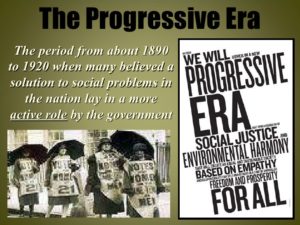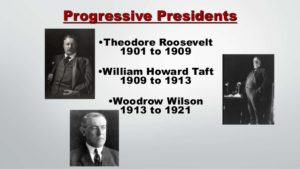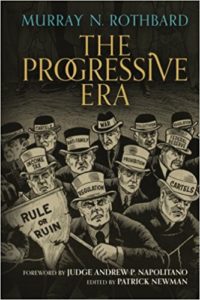What You Were Never Supposed to Learn
How Evangelicalism Ruined America
One of the most important factoids I learned from reading Murray Rothbard’s book, The Progressive Era (Mises Institute. 2017.), was the impact of faith on government. In short, the joining of morality and government power to create a godly society is the history of America. In a nutshell, this is postmillennialism put into practice, this is America today gone wrong.
The modern evangelical community has accepted the myth that America was a Christian or godly nation until it was taken over by the modern liberals in the early to mid 20th century. Any deviation from this mythology is called revisionist history and loudly condemned from the pulpits. This viewpoint though was learned in government, compulsory schools which taught only that which the government wanted students to know in support of government goals. Since government goals change over time there is always the clash of generational ideals that add noise to confuse the overall clarity of truth. The government works behind this noise achieving its goal of absolute power over its citizens. In America this is accomplished internally via the consent of the governed, usually, though in many countries this occurs at gunpoint to varying degrees of unrest.
I have always maintained that all values are religious; i.e., a set of beliefs in right and wrong ingrained in the human condition common to all peoples (Ro 1:18-25). Thus, even atheism is a religion since it posits a set of values that determine right and wrong, also known as good and evil. Therefore, every time you make a value decision or judgement or discernment you are exposing your religious foundation even if that foundation is secular humanism, liturgical (Roman Catholic, Old Lutheran, etc.) or pietist (Evangelical, Methodist, Protestantism, etc.). Governments are built upon these value judgments and legislate morality that may or may not conform to the beliefs of its citizens {in which case historically force is used to obtain compliance to some degree}. America began during the Pietist Movement which influenced how religion affect America’s history which also became known as the First Great Awakening and the Second Great Awakening. Out of the former came the ethos that enabled the Revolutionary War and the birth of the United States. Out of the latter came a rigid morality demanding government force to bring all peoples under the same morality which began with the Civil War but culminated in the Progressive Era that laid the foundation for the America we have today {with significant modification during the dramatic changes of the 1960s and 1970s which is beyond the scope of this post}.

“A More Active Role of Government” means
Use of Government force to make social changes
Postmillennialism is the belief and practice to make society better by Christian standards until Christ returns to accept this improved society. These great awakenings were nothing more than the implementation of postmillennialism. This started with the Puritans/Pilgrims in New England and spread throughout all America via the Second Great Awakening and the growth of public education {which began in New England} in order to indoctrinate children into Protestantism and its attendant view of morality. These pietists were pitted against the liturgists who saw their Church as the true definer of morality. Simply put, the liturgists used their Church to enforce morality while the pietists used government. The former were successful during the Medieval period while the latter became successful from the Enlightenment into the Modern periods. Herein is the confusion, public education taught that pietistic values made America strong because there was no state Church; however, that does not mean there was no state religion, there was – Pietism.
Thus, the liturgical believed in decentralized government, free trade, hard money based on gold and individual rights while the pietists believed in strong central government, controlled trade via tariffs, inflationary money and less individual rights. The Republican party up until the Progressive Era was the party of pietism; thus, the Civil War forced a strong central government on those who did not want this. However, the Democratic party, though liturgical in nature, constantly flirted with strong central government ideology via Jefferson’s Louisiana Purchase, Jackson’s use of government force to dislocate native Americans and the South’s demand for government support for enforcement of pro-slavery laws. Much of this changed in the Progressive Era.
The Republicans were losing elections by the 1880s forcing prohibition onto citizens at the local and state levels; thus, they became less pietistic while the Democrats became more pietistic under the influence of Willams Jennings Bryant. Thus, many of the liturgical bolted the Democratic party for the Republican party and many Republicans either formed new parties or joined the Democrats. This great transformation had the ultimate effect of changing the Democrats into advocates of strong federal government control while the Republicans moved to a moderate stance on federal government use of power to force morality. This explains the voting patterns previous to and merging into the Progressive Era.

These “moral” crusaders were paid for by
either Morgan or Rockefeller money
The Republican, Roosevelt (TR), as in the Morgan camp. His moral crusade against trusts was limited to Rockefeller trusts. Though he is credited with “controlling” the railroads his legislation was actually written by the railroads to stop price discounting and discourage competition. Thus, TR’s propaganda misled the people of his day and its influence continues. He also started America’s international expansionism that continues today. While Taft tried to reverse some of these elements who did so to win back gains to the Rockefeller camp. The Morgan camp pitted TR against Taft to split the vote in order to elect Wilson (WW) who was in their camp. WW was an ardent pietist. He believed his was morally committed to reshaping American and the world as he believed it should be to make it better. To this end he involved America in World War I so he could shape the resulting peace negotiations {to this end he was only partially successful-League of Nations}.
Why is any of this important to you today? Many evangelical churches preach homage to the government, the military and the police especially on holidays that honor the government or its forces. They are continuing in their pietistic statist ways though they may claim to be for individual rights and small government. This pietism was rejected in the 1960s and continues to sweep away old values though it exhibits its own form of piety for its secular humanistic beliefs. The former bemoans the loss of a godly America while the latter militantly rejects any limits on morality, sometimes bordering on anarchy.
My point is that society cannot be made better by legislation. That is legalism and did not work for Israel {Judah} to make them ready to receive Messiah; in fact, their legalism blinded them making them enemies of Christ and His ensuing Gospel message. How can Christians support any party that does not have the Gospel as its central tenet? This is the very form of worldliness that James condemns. Thus, while Christians pontificate about alcohol, movies, and dancing they ignore the weightier matters of gospel truth (Mt 23:23-24; Lk 11:42). This misdirection only makes the Christians emulate the Pharisees of the Gospels turning the Gospel a hated doctrine! What is the Christian to do then?
If saved Christians marry saved Christians {redundant I know} they will rule their homes as refuges in this dark, sinful world. Their children will be shown the difference between a godly home and the chaotic environment of the sinful world though this will not guarantee their salvation either. The darker the world becomes the brighter will shine the Gospel in the lives of true believers who do not seek to use government to force morality onto others, though they will use the government to force their immorality onto us as they did in Paul’s day. In this way many will come to the knowledge of the truth drawn by Christ and not by force of government which is a great evil. Did Christ use force in His day? Then, neither should we in our day.

